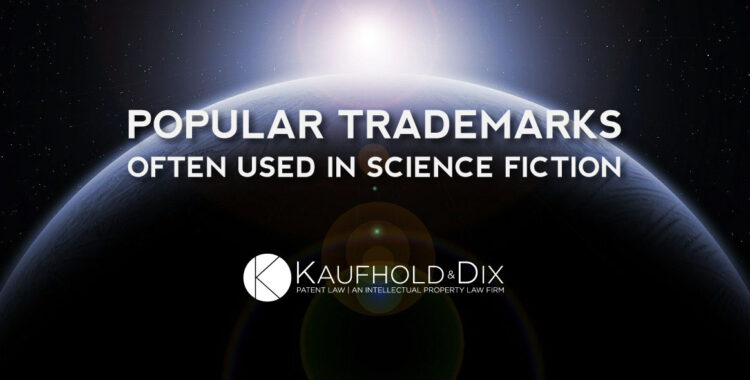Popular Trademarks Often Used In Science Fiction
US trademark laws can sometimes be confusing. Trademark confusion can be true in the fanfiction industry due to some oddities in what has been trademarked and it begs that question for creatives who often wonder, “Can I obtain intellectual protection for my work?”
We’ve compiled a list of four famous trademarks, often used in science fiction, to inspire to shed some light on what it takes to gain intellectual property rights in this area.
A Quick Trademark Recap
Generally speaking, trademarks are intellectual property rights for words, images, and combinations thereof that individuals and businesses use to identify the source of their products and services. For example, the phrase “Coca-Cola” is a trademark of the Coca-Cola company, while the “Swoosh” is a trademark of sportswear company Nike. It is the perception of the consumer of the good or service which is important and therefore a good trademark is one that ensures a consumer knows which company is supplying the goods or services. A well-established trademark is one that evokes in the consumer’s mind the company behind the product.
The main benefit of trademarking goods and services is to differentiate between competing products on the market. Trademarks ensure product recognition while building trust and goodwill among consumers. Registering a trademark protects a business owner against intellectual property infringement; specifically trademark infringement, whereby company B uses company A’s mark to confuse consumers into buying company B’s product. The infringing mark need not be an exact copy and intent to confuse does not need to be intentional. Instead, infringement is based on whether or not a consumer has been or is likely to confuse the two marks as being representative of the same company.
Beware that trademarks are not the same thing as copyrights. Although both are intellectual property protection tools, they serve different purposes. Whereas copyrights protect original artistic works, trademarks are more concerned with product and business identifiers, such as design and word logos, to provide the customer with knowledge as to the business source.
Another critical difference between the two is that a copyright is established automatically upon creating the original work. Meanwhile, trademarks are established through their everyday use. That is, if the trademark is not being used, even if once acquired, it will be lost.
More information can read more on copyrights vs. trademarks vs. patents in our
Intellectual Property Playbook – An Entrepreneur’s Guide To Patents, Trademarks, and Copyrights.
Intellectual Property Playbook
An Entrepreneur's Guide To Patents, Trademarks, and Copyrights GET THE PLAYBOOK
4 Famous Trademarks Often Found In Science Fiction
While it may seem antithetical that common science fiction terminology could be protected by trademarks, there are instances where trademarks are utilized and vigorously enforced as well due to their widespread, consistent, and infamous usage by their respective companies.
1) Super Hero
Yes, “Super Hero” is a trademark. DC Comics and Marvel Comics jointly own the mark and is a rare case of jointly-owned trademarks. The two companies also jointly own the trademarks “Super Heroes” and “Super-Villains.”
The official registration of the trademarks means that everyone else is legally barred from marketing or promoting items using the terms “Super Hero,” “Super Heroes,” or “Super Villain.” So, for example, an author cannot call their comic book “Super Heroes” or, say, “Super Hero Giants.” In once instance Marvel and DC forced GeekPunk into having to change their comic title “Super Hero Happy Hour” and it became “Hero Happy Hour.”
2) Droid
Droid, short for Android, the now Google-owned smartphone OS, is a trademark of Lucasfilm. For this reason, Motorola Droid ads typically feature a trademark notation specifying that Lucasfilm owns the mark with language similar to “Droid is a trademark Lucasfilm Ltd.” Likewise, Lucasfilm has also trademarked the phrases “Battle Droid” and “Destroyer Droid.”
While the term “android” has been utilized for multiple centuries, Lucasfilm has established that it uses the term for its specific robots and has been extremely vigilant on the use of the term by others. Thus, when making the Incredibles Pixar obtained permission from Lucasfilm to name one of their robots “Omnidroid.”
3) -Zilla
A more unusual mark found in many science fiction movies and comics is “-Zilla” – a trademark of Toho Studio. Since the term “Godzilla” has entered the common lexicon one would be lead to believe that it has become generic and as it is often used as an adjective. But Toho Studio enforces this mark rigorously and therefore even names such as “Filezilla” are wise to first seek permission to use any words that end in -Zilla.
The retailer Sears was confronted with this issue. Toho filed suit against Sears for trademark infringement when the retail chain began selling bags bearing the word “Bagzilla.” The case was eventually dismissed, with the court stating that the products were unrelated. However, it shows the lengths Toho Studio is willing to go to protect their trademark and because enforcing a trademark is essential to prevent its loss, trademark holders often try to push their rights to their, sometimes illogical, limitations.
4) Monster
Though not related to science fiction in its filings, “Monster” is also a trademark. Unlike the marks above, it is more limited and tied to specific goods. This mark is registered by Monster Cable Products (MCP), which owns more than 70 trademarks on the word “Monster,” with the first mark registered as far back as 1980.
As you would expect, MCP has had difficulty trying to expand its rights outside of the very narrow usage for cabling and other related electronic peripherals. For example, in the early 2000s, MCP entered litigation against Disney when the entertainment company launched Monsters Inc. MCP also sued the Monster Mini Golf franchise a few years later. However, these lawsuits show the limitations of what a trademark holder can achieve. In the latter case, the court sided against MCP and forced MCP to pay $200,000 in legal fees for bringing a frivolous trademark infringement case.






